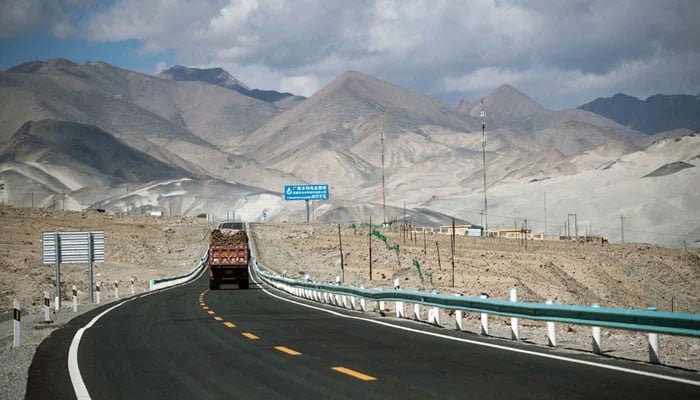If not managed well, CPEC could be a missed opportunity: ex-ambassador
Islamabad : Pakistan’s future development requires a clear strategy that integrates nation-building efforts into policy decisions to address governance crisis, foster ideological unity, and leverage the nation’s untapped potential in emerging sectors like tourism and technology.
Additionally, there is a need for a unified, comprehensive approach in policy decisions and reforms to address the complex challenges that have built up over the last seven decades.
This was the central message delivered by former diplomats during the annual meeting of National Advisory Council of the Institute of Policy Studies (IPS) here.
The event, moderated by former ambassador and IPS vice chairman Syed Abrar Hussain and chaired by IPS chairman Khalid Rahman, was held to garner intellectual input from veteran practitioners for the leading think tank's research activities and realistic ideas regarding national issues.
Former ambassador Masood Khalid highlighted Pakistan’s policy-making crisis, stressing that “policies made in silos” lead to weak coordination and ineffective implementation.
He highlighted the absence of strategic clarity and the internal tension between reformists seeking change and those clinging to the status quo as major barriers to progress.
Mr Khalid said that tug-of-war reflected a deeper crisis within Pakistan’s policy-making framework.
"One such example is Pakistan’s approach to the China-Pakistan Economic Corridor. While CPEC presents a unique window of opportunity, the lack of coherent, strategic policies jeopardises its potential. If CPEC is not managed attentively and diligently, it could become a missed opportunity, reflecting broader policy dysfunction," he said.
The ex-envoy said in order to capitalise on such opportunities, Pakistan must create an enabling environment that fostered ease of business, particularly for Chinese investments.
Former ambassador and former AJK President Sardar Masood Khan, who was also in attendance, said nation-building must be prioritised to strengthen national unity and identity.
“As an ideological state, Pakistan must assert its core principles with confidence,” he stated. He warned of the growing ideological disunity among both the leadership and the general populace.
Mr Khan said Pakistan must find a balance, learning from these trends while staying true to its ideological roots.
-
 Neve Campbell Opens Up About Her 'difficult Decision' To Not Sign 'Scream 6'
Neve Campbell Opens Up About Her 'difficult Decision' To Not Sign 'Scream 6' -
 Nobel-winning Scientist Resigns From Columbia University After Epstein Links Revealed
Nobel-winning Scientist Resigns From Columbia University After Epstein Links Revealed -
 Prince William Remarks At BAFTAs 'indicative' Of King Charles Physical, Mental Health Too
Prince William Remarks At BAFTAs 'indicative' Of King Charles Physical, Mental Health Too -
 Kanye West's Last Measure To Save Bianca Censori Marriage As He Tries To Salvage Image
Kanye West's Last Measure To Save Bianca Censori Marriage As He Tries To Salvage Image -
 Kim Kardashian Finally Takes 'clear Stand' On Meghan Markle, Prince Harry
Kim Kardashian Finally Takes 'clear Stand' On Meghan Markle, Prince Harry -
 Christina Applegate Makes Rare Confession About What Inspires Her To Keep Going In Life
Christina Applegate Makes Rare Confession About What Inspires Her To Keep Going In Life -
 Patrick J. Adams Shares The Moment That Changed His Life
Patrick J. Adams Shares The Moment That Changed His Life -
 Selena Gomez Getting Divorce From Benny Blanco Over His Unhygienic Antics?
Selena Gomez Getting Divorce From Benny Blanco Over His Unhygienic Antics? -
 Meet Arvid Lindblad: Here’s Everything To Know About Youngest F1 Driver And New Face Of British Racing
Meet Arvid Lindblad: Here’s Everything To Know About Youngest F1 Driver And New Face Of British Racing -
 At Least 30 Dead After Heavy Rains Hit Southeastern Brazil, 39 Missing
At Least 30 Dead After Heavy Rains Hit Southeastern Brazil, 39 Missing -
 Courtney Love Recalls How ‘comparison’ Left Marianne Faithfull ‘broken’
Courtney Love Recalls How ‘comparison’ Left Marianne Faithfull ‘broken’ -
 Pedro Pascal Confirms Dating Rumors With Luke Evans' Former Boyfriend Rafael Olarra?
Pedro Pascal Confirms Dating Rumors With Luke Evans' Former Boyfriend Rafael Olarra? -
 Ghost's Tobias Forge Makes Big Announcement After Concluding 'Skeletour World' Tour
Ghost's Tobias Forge Makes Big Announcement After Concluding 'Skeletour World' Tour -
 Katherine Short Became Vocal ‘mental Illness’ Advocate Years Before Death
Katherine Short Became Vocal ‘mental Illness’ Advocate Years Before Death -
 SK Hynix Unveils $15 Billion Semiconductor Facility Investment Plan In South Korea
SK Hynix Unveils $15 Billion Semiconductor Facility Investment Plan In South Korea -
 Buckingham Palace Shares Major Update After Meghan Markle, Harry Arrived In Jordan
Buckingham Palace Shares Major Update After Meghan Markle, Harry Arrived In Jordan




